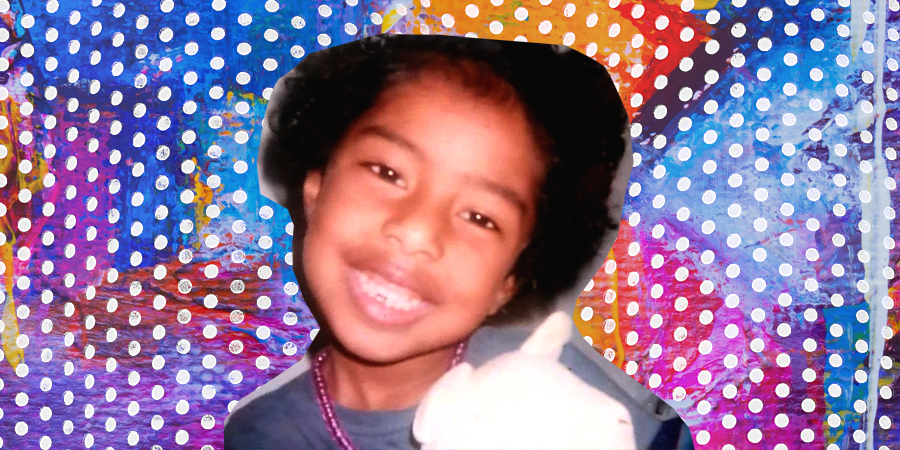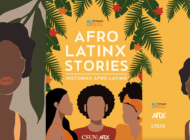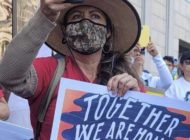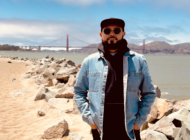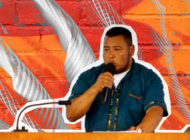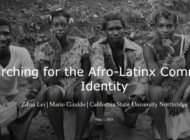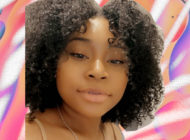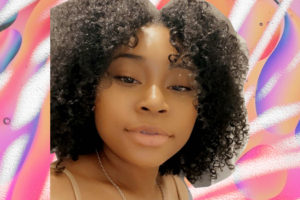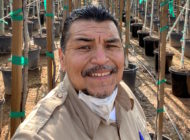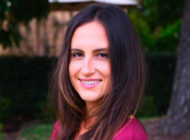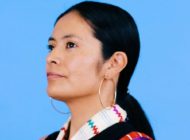In this episode, Diana Romero talks to Nicole Favors, whose father is from Marion, Ohio, and her mother is from Romita, Guanajuato.
By DIANA ROMERO
EL NUEVO SOL
Diana Romero: Welcome to Radio Nepantla, a podcast by El Nuevo Sol, the multimedia site for the Spanish-language journalism program at California State University at Northridge. My name is Diana Romero. The title of this series is Afro-Latinx. We want to tell here diverse stories of Afro-Latinx, Black-Latinx, and Afro-Latin American identity. According to the Pew Hispanic Center, one out of every four Latinos in the nation identify as Afro-Latinx. This is the same proportion of Afro-Latin Americans in that region. We decided to use the term Afro-Latinx—with X—to be inclusive of non-binary people. The umbrella term “Black-Latinx” refers to biracial people with one African-American and one Latinx parent. The umbrella term “Afro-Latin American” refers to people of African ancestry in Latin America.
In this episode, I interviewed Nicole Favors, an Afro-Latinx. Nicole and I spent most our conversation talking about hair, and how it became a big role in her life. Before I jump into that, I want to give you a little background of Nicole.
Nicole Favors: So growing up, I lived in North Hollywood for some time. I spent a majority of my toddler years in North Hollywood. And then as I shifted to middle school, I moved to Santa Monica, which was really new. And it was kind of a big change from being out in the Valley—and then, you know, seeing what life was like out in Santa Monica.
So, my dad is actually from Ohio—and so it’s two completely different places. My dad is from Ohio in a small city called Marion. And my mom, she was born in Mexico and she was born in Romita, Guanajuato—and she came over here when she was younger. And then her and my dad both met in L.A.—which is really, really crazy, you know, considering they came from like two different places. But yeah, I think it’s every—like when they told me about the story, it’s like, how they met, and, like, the building in L.A.— I’m like, “whoa.” Like it was really crazy that my mom was there and then, just like my dad happened to be there. And you know everything—and so, like, me being here now I’m like, “oh that’s how I was created because of that.”
Diana Romero: Nicole opens up about how middle school is where she began to feel different from her peers.
Nicole Favors: (In) middle school I started off by going to Walter Reed Middle School, which is in Studio City. I didn’t stay there for long but, while I was there, I think, just, I was really able to like, you know, understand that I was different. But I didn’t really understand what different meant for me. And I think it really became really noticed. I just like really started to understand that when—you know, my choice of making friends, it was really, almost like, different to other people.
Diana Romero: Nicole had friends from both of her cultures—but she did feel like she leaned to one side a little more than the other.
Nicole Favors: I would have friends who were like Mexican, Hispanic, and then I would have friends who were African-American. But I always felt, like automatically, like I had to make friends with African-Americans. Or, that was like the first people that I felt like, you know, like, that we’re like kind of close to me in a sense. But then, it was really hard to, like, have both, you know? I know the Mexican culture like from food—we eat—you know, things that we do. You know, (we have) certain traditions and everything. But it was hard to feel like I could be accepted by one. Or, it was like, I had to be accepted by one or the other, you know? I couldn’t have both.
Diana Romero: She would get questioned about who she was and how she identified herself. It progressively got worse when someone would ask her to choose which one she was more a part of.
Nicole Favors: I automatically then started to strip away from my Mexican background. And like, you know, that part that identified with myself. And I automatically felt like I had to give that up in order to make friends with certain people. And to feel like I was able to fit in. And all the time, I actually experienced this quite so many times, like people would be like, “so are you Mexican? Or, are you Black, are you African-American? Like which one do you identify more with?” And it would just really strike me, and I would think about this. I’m like, “well, how are you going to make me choose?” And then I go back and I think about you know, like the experiences that I had and like time that I spent, you know, with my grandparents, you know, my Mexican grandparents. Oh my gosh, it’s like, I really can’t say that I’m one or the other, because I feel like both of them, you know? They make me who I am, you know?
Diana Romero: Nicole gave insight on how she would get called out for not being Mexican enough and Black enough.
Nicole Favors: That actually happened several times. I was like told like, “oh, you’re not Mexican enough to hang out with us, to do certain stuff with us.” And then, at the same time, it was like, “Do I kind of listen and take into what they’re saying?” And then I kind of like started to doubt, you know? Like, “who”—and like kind of really feel insecure about where I stand with that. And I think there were more times, where I was where it was like, “oh, you’re not Black enough to fit in or like certain things that we do.” So it almost made me kind of want to, you know, step back and be like, “okay, so there’s certain things that I can and cannot do.” And I think one thing that makes me really think of about how they question really ties into braids. As of recently I was thinking about getting braids on my hair. And one of the things I think about actually is like, “Am I Black enough to get braids?” “Am I,” you know, “am I okay to wear braids?” Because I think growing up like it really almost, you know, left, I don’t want to say, like, an imprint, but I do. As to, like, the way that I do things now and sometimes, you know, thinking before I do them when I should feel okay to do either or, you know? Braiding my hair is totally fine, like I’m a part of that, like I belong.
Diana Romero: She talks about how she gets stared at a lot when she is with her mom. She feels the need to act more Mexican to prove that she belongs there.
Nicole Favors: I will commonly, like, get stared at. And I feel like I’m almost obligated—I feel the urge to speak Spanish to feel like, “okay I fit in here, too.”
Diana Romero: Nicole discusses her experience with growing up having Afro hair with a Mexican mom who didn’t know how to treat it.
Nicole Favors: When I was younger, with my mom being Mexican-Hispanic, she just thought, you know, let her hair out. You know, like that’s how it usually is—that’s what she did with her hair. So, a majority of the time my hair is just like poofed out. Because she just didn’t know how to deal with, you know, like the hair being so thick and curly. When I was younger I had, like, almost no hairstyles.
Diana Romero: Nicole goes on to further explain that her hair has always been a constant struggle for her.
Nicole Favors: I think, actually well not even think like, one of the things I’ve struggled with a majority of the time is my hair. My hair at one point, it was super puffed out. It was, almost, it was really long. It legit went to, almost … I want to say, like my mid-back when it was straightened, right? And people would come up to me in school and be like, “Oh, is that your hair? Can I touch it? Can I feel it?” And I was like, “Well what on Earth would make you think that my hair isn’t real?!”
Diana Romero: Her hair became a big issue to the point where she made a huge decision.
Nicole Favors: I struggled with that also in middle school, and because of that, I actually shaved my whole entire hair off. I cut it off because, I was like, “I just can’t stand people asking me all these questions.” And, like, the stares that I would get it was just… It was just I—I was like, “enough is enough.” Like, you know what, I don’t want my hair to, you know, identify who I am, you know? And I cut it off. And I think people looked at me differently. They’re like, “oh, so like you don’t have your hair anymore?” They’re like, “why not?—it’s beautiful.” I’m like, “well, we all have different definitions of what beauty is.”
And, for me it was never like, “oh my gosh, my hair’s like a golden prize or my hair is everything to me.” I’m like, “no—it’s just hair.”
Diana Romero: Nicole has wanted to have braided hair, but feeling like she can’t, always stops her. She gives out a perfect example that happened to her, as to why she is still too timid to braid her hair.
Nicole Favors: And one thing that actually I want to bring a topic on—I was actually at the time, I think it was last year, I was going—I went to this store, or like this, this place where they do braids. And this is a whole new shop. I’ve never been here and my moms like, “oh, like let’s go in—let’s look at the prices and see how much they charge for the style you want.”
I’m like, “okay, yeah, let’s just get an idea,” you know? At that time I was also kind of like one foot in, one foot out. “Should I get braids? Should I not?” We go to the store and all the women in there are African-American. And they start looking at me with my mom entering the store, right? So, all eyes are on us—everybody’s looking at us and we go up to the lady and as we’re passing by, you know, the main lady who’s doing the hair and everything. One of the girls that was there whispers, like, to the other girl, like, “oh, what is she even doing here?” And I just—then, like, you know, it was in the back of my mind—I was like, “okay, I’m here for the braids. I’m not gonna even focus on that.” And she’s like, “oh, can you show me a picture of what you want?” The next person (who) was probably going to get braided, she was sitting there, she just, like, eyes me up and down and then looks at my mom. And it’s just so crazy, because I feel like through the eye contact like even, you know, even though she didn’t have to say anything it’s still, you know, I still could understand what she was trying to say with her eyes. And she tells us a price, and she gives us a card. And then we leave because I just didn’t feel right—I didn’t feel like I could be there and I didn’t feel comfortable. And that experience also kind of left, like, an imprint. So like, me even wanting to get braids from that time—as to what happened, I was like, “what am I doing? Do I even—like, can I even do this? Is this something that I can do? Am I allowed to do it?” You know, like, “what will other people think when they see me on the street?” You know?
Diana Romero: She also worries about what others are going to say when people see her in a new hairstyle with her Mexican mother.
Nicole Favors: With, like, you know, if they see me with my mom, you know, and I had braids on—like, are they going to think that I, you know, I’m just trying to fit in? Or like trying to do stuff, you know, that’s related to their culture. But at the same time, I can, you know? Like, its—I have the permission to do so. But people just don’t know that unless they talk to me.
Diana Romero: Despite Nicole’s struggles of being bi-racial, she felt like it was necessary to go through these experiences to be who she is now.
Nicole Favors: I think it took time, like, I think, even with the experiences and everything, I wouldn’t be here today… without that. And I wouldn’t feel more comfortable with myself if I didn’t do those things, you know?
Diana Romero: Thanks for listening to Radio Nepantla: La Voz que Traspasa Fronteras. We invite you to listen to the rest of the series Afrolatinx. We will tell you stories of Afro-Latinx identity.
Listen to our podcast on your favorite platform. You can also check our SoundCloud channel-ElNuevoSol-or our website: ElNuevoSol dot net. This was a production of El Nuevo Sol–the multimedia project of the Spanish-Language Journalism program at Cal State University, Northridge.
This episode was produced and edited by: Diana Romero.
Voices Diana Romero and Nicole Favors.
Music by the Afro-Colombian group Kombilesa Mi. See you next time.
Tags: #AFLX Afro-Latinx Diana Romero Nicole Favors podcast Radio Nepantla







